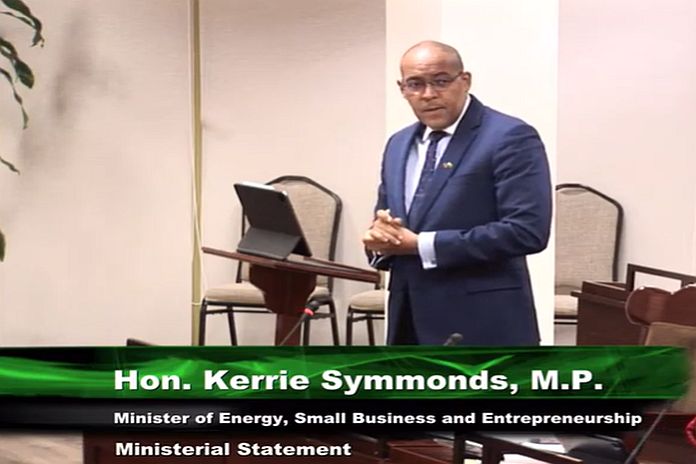By Caribbean News Global contributor
BRIDGETOWN, Barbados – Minister of energy, Kerrie Symmonds, in a March 29, ministerial statement, advised that the government of Barbados desires an environmentally safe and unsullied future for all Barbadians, and that it is the ambition of this government to shape an environment which is the most pristine in the western hemisphere and therefore, … the single most effective way of making our environment less polluted, is by ending fossil fuel burning; meanwhile announced an Accelerated Investment Premium Programme for the renewable energy sector for Barbadian Nationals.
Minister Symmonds, said: “To contrast Barbados from other Small Island developing states, and indeed, from the overwhelming majority of other nations on earth. … by focusing, on the scope and pace of our efforts to decarbonize our economy. “
He illustrated: “The scale and broad contours of the decarbonisation challenge have been addressed at the global level by the long term goals of the Paris Agreement, which includes achieving global greenhouse gas neutrality, by the start of the second half of the 21st century. An illustrative benchmark in this regard is seen in the case of the USA which for example, has signaled an intention to achieve an 80 percent reduction from 2005 levels in its economy-wide emissions by the year 2050. The government of Barbados has, however, taken the more aggressive stance of committing to the transformation of the economy of Barbados by severing this island`s exposure to the volatility of fossil fuel markets.”
In March of 2019, the Barbados National Energy Policy 2019-2030, was approved, by the House of Assembly, minister Symmonds noted.
“ This robust policy declaration created a bold 11-year implementation horizon within which Barbados would achieve its vision of becoming 100 percent fossil fuel-free by the year 2030. The goal of achieving net-zero emissions, or in other words achieving an overall balance between the greenhouse gas emissions we produce and the greenhouse gas emissions we take out of the atmosphere, will require substantial investment by the private sector. This investment is driven by feed-in tariffs for renewable energy generators to receive, when they supply electricity to the grid. It follows logically, that the higher the feed-in tariff, the more attractive the sector becomes for investment.
“We have on the other hand, however, a duty to strike a balance with the need to suppress electricity prices, which should be achieved as a natural consequence of the deployment of new technologies. Alongside these long-term environmental goals and aspirations, our economy continues today to be in a challenged position due to the impacts of the COVID-19 pandemic, we need a return to growth so that we can cause employment levels to rebound and secure recovery in the private sector.”
The energy minister statement advanced that growth requires investment, but the uncertainty surrounding COVID-19 has dampened the spirit of enthusiasm of investors in most of the economy. With potential investors now waiting in the hope of seeing things recover.
We have an opportunity today, to bridge two things, said minister Symmonds. “First, we can accelerate our steps towards shaping the most pristine environment for our island. Second, the need for investment today in the economy as a whole can be tackled.”
He further described that “this can be done, through the use of feed-in tariffs to drive investment in renewables, so that we can get to net-zero emissions and a sustainable future. The bridge of which I speak is an Accelerated Investment Premium on the FTC’s determined feed-in tariffs for solar and wind generation. This Accelerated Investment Premium is designed to deliver a green recovery to Barbados and create green opportunities for employment and investment to Barbadians.”
“There are local potential investors who are seeking an opportunity to make investment and drive economic activity and employment in the land of their birth. We believe that one of the more efficient ways in which a country can spur development and growth, is to encourage investment from within, by local entrepreneurs. In this regard, we emphasize that investment can be incentivized within the local energy sector, through the minimization of risk in this overarching climate of uncertainty,” the minister said.
As at December 2020, Barbados had an installed capacity of 49 MW of renewable energy from solar photovoltaics on the national grid. This consisted of 39 MW of distributed and 10 MW of utility-scale energy and represents 68 GWh or an estimated 8 percent of the total electricity consumed, saving an estimated 114,412 barrels of oil or $9,215,961 in foreign exchange.
According to minister Symmonds: “We still have a long way to go in order to achieve our 2030 vision. It is in that regard that I have the honour [today] to announce before this Chamber an Accelerated Investment Premium Programme for the renewable energy sector for Barbadian Nationals.
“This programme is proposed to incentivize the sector by promoting and encouraging local investment. This Accelerated Investment Premium Programme will take the form of:
- A 25 percent premium for investments made in solar and wind technology systems above 1MW and up to 3MW, and
- A 20 percent premium for investments made in solar and wind technology systems above 3MW and up to 5MW.
“These investment premiums will be applied to the prevailing tariff rates established by the Fair Trading Commission, and will continue for a period of 12 months. In an effort not to disadvantage applicants who have already applied, but are still awaiting licences, these premia will be made retroactive to cover the period from October 1, 2020, and will continue for the period of 12 months from today as previously indicated, or until the new limit of 75 MW has been utilized, whichever comes first.
“We believe the premia will offer an incentive to Barbadians to get more involved in the generation of renewable energy, as well as the stimulation of economic activity and employment, and also to position themselves to benefit from the process of greening the Barbadian economy,” the energy minister statement concluded.





